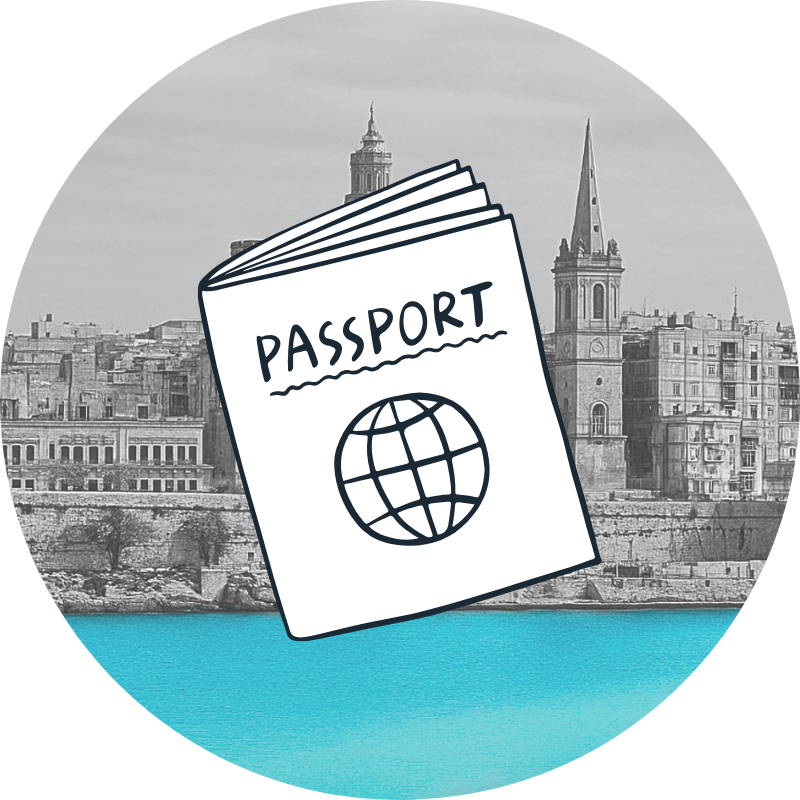Malta für Expats: Ein umfassender Leitfaden für Europas wachsendes Technologiezentrum
Eingebettet zwischen Europa und Nordafrika, liegt der Inselstaat Malta ist seit langem ein Kreuzungspunkt von Zivilisationen, von Phöniziern und Arabern bis hin zu Italienern und Briten, die alle Spuren in ihrem Erbe und ihrer Kultur hinterlassen haben. Seit der Unabhängigkeit im Jahr 1964 hat sich diese Nation im Mittelmeerraum zu einem stabilen EU-Mitglied mit einer starken Dienstleistungswirtschaft, einer ausgeprägten internationalen Identität und Englisch als Amtssprache neben Maltesisch entwickelt. Ende 2024 zählte die Insel 574.250 Einwohner, davon fast 30% waren ausländische Staatsbürger.
Expats werden nicht nur vom milden Klima und der ganzjährigen Sonne hierher gezogen, sondern auch von der lokalen Englischsprachiges Umfeld und günstiges Steuersystem. Dank seiner gut ausgebaute digitale Infrastruktur, optimierte Visawege, und Ruf als sichere, innovationsgetriebene europäische Drehscheibe, Malta zieht junge Technologiefachleute, Unternehmer und Unternehmen an, die auf Digitalisierung setzen.

In diesem Leitfaden werden wir die wichtigsten Aspekte des Arbeits- und Geschäftsumzugs nach Malta behandeln: verschiedene Arten von Visa und Aufenthaltstiteln, das Steuersystem und den Lebensunterhalt. Wir werden auch untersuchen, welche Gruppen von Ausländern die meisten Chancen auf eine reibungslose Integration haben, potenzielle Herausforderungen erörtern und alternative Wege für eine vereinfachter und stressfreier Einwanderungsprozess.
Welche Arten von Visa gibt es für Nicht-EU-Bürger in Malta?

Um in Malta berufliche Tätigkeiten ausüben oder ein Unternehmen gründen zu können, müssen Nicht-EU-Bürger eine Arbeits-/Aufenthaltserlaubnis beantragen. Stand Ende 2025 Die folgenden Arten von Genehmigungen sind verfügbar:
- Arbeitsvisum (Typ D), das für Personen geeignet ist, die beabsichtigen, in maltesischen Unternehmen angestellt zu werden. Um einen für einen ausländischen Arbeitnehmer zu erhalten, ein Arbeitgeber in Malta muss nachweisen, dass er nicht in der Lage war, einen qualifizierten Einheimischen oder Einwohner der EU zu finden. Zu den weiteren Visabestimmungen gehören ein Mindestgehalt pro Jahr (ca. 21.000 EUR pro Jahr) und die Einhaltung der lokalen Arbeitsgesetze. Es ist erwähnenswert, dass Die Erfolgsquote einer Beantragung eines Arbeitsvisums hängt von der gewünschten Branche ab, wobei IKT-Fachkräfte und unternehmensintern versetzte Arbeitnehmer die höchsten Zulassungschancen haben. Letztere können das Land mit einer Genehmigung für unternehmensinterne Transfers.
- Das Blaue Karte EU, das für hochqualifizierte Fachkräfte aus Übersee geeignet ist. Um in Frage zu kommen, muss ein Nicht-EU-Bürger einen Arbeitsvertrag mit einer Laufzeit von mindestens 6 Monaten, einen Qualifikationsnachweis (z. B. einen Hochschulabschluss) und ein voraussichtliches Gehalt vorlegen, das 1,5-mal höher ist als der maltesische Durchschnitt. In der Praxis ist das Land sucht aktiv nach hochqualifizierten ausländischen Talenten: Die Wirtschaft ist mit Engpässen in den Bereichen Gesundheitswesen, Bauwesen, Transport und Gastgewerbe konfrontiert, weshalb Expats in diesen Sektoren häufig Stellenangebote finden.
- Das Startup Residence-Programm, das sich an Gründer innovativer Unternehmen aus Drittstaaten und deren Kernbeschäftigte richtet. Um eine entsprechende Arbeits- und Aufenthaltserlaubnis zu erhalten, muss eine Einzelperson muss eine materielle Investition und/oder ein eingezahltes Aktienkapital platzieren von mindestens 25.000 EUR und engagieren Sie sich für eine oder mehrere der folgenden Branchen: Produktions- oder Industriedienstleistungen, Softwareentwicklung, Gesundheit, Biotechnologie, Pharmazie und Biowissenschaften, Öko-Startups, die in der blauen, grünen und nachhaltigen Industrie tätig sind, oder andere innovative wirtschaftliche Aktivitäten. Langfristig kann dieses Investitionsprogramm zum Erwerb einer unbefristeten Aufenthaltserlaubnis und der Staatsbürgerschaft führen.
- Aufenthaltserlaubnis für Nomaden, das 2021 eingeführt wurde und für Nicht-EU-Bürger geeignet ist, die in Malta wohnen möchten, während sie für ein ausländisches Unternehmen oder Kunden arbeiten. Zulassungskriterien beinhalten ein Mindestgehalt von 42.000 EUR pro Jahr und einen jährlichen Aufenthalt von mindestens 183 Tagen in Malta. Diese Art von Genehmigung kann zwar für maximal 4 Jahre ausgestellt werden, ihre Inhaber genießen in den ersten 12 Monaten ihrer Tätigkeit Steuerbefreiungen (mehr dazu im nächsten Abschnitt), was Malta für Telearbeiter und Selbstständige mit ausländischem Einkommen besonders attraktiv macht.
Wie viel Steuern zahlen Expats auf Malta?

Malta besteuert Privatpersonen mit einer Aufenthaltsbasis, mit Sonderregelungen für Neuankömmlinge. Einwohner ohne Wohnsitz (Expats) zahlen Steuern nur bei Einkünften, die nach Malta überwiesen werden. In der Praxis bedeutet dies, dass ausländische passive Einkünfte (Mieten, Dividenden, Renten) und Kapitalgewinne unversteuert bleiben, sofern sie nicht ins Land gebracht werden.
Persönliche Einkommensteuer Die Steuersätze sind bis zu 35% progressiv, aber aufgrund des Überweisungsregimes zahlen viele wohlhabende Expats nur sehr geringe maltesische Steuern auf Offshore-Einnahmen. Darüber hinaus gibt es noch andere Anreize, wie zum Beispiel:
- Keine Steuer auf ausländische Kapitalgewinne (immer), und nur überwiesene ausländische passive Einkünfte werden besteuert (oft bei etwa 15%).
- Arbeitseinkommen aus dem Ausland (für Dienstleistungen, die aus der Ferne erbracht werden) wird besteuert zu einem Pauschalpreis von 10%, mit der anfänglichen 12-monatigen Ausnahmeregelung. Diese Rate ist besonders lukrativ für IT-Freelancer, Berater mit hohem Einkommen und Führungskräfte aus der Ferne.
- Das Programm für hochqualifizierte Personen (HQP) bietet Fachleuten ohne Wohnsitz in Branchen wie Finanzen, Glücksspiel oder Luftfahrt eine Pauschalsteuer von 15% bei Gehältern bis zu 5 Millionen EUR, mit Auf den Überschuss wird keine Einkommenssteuer erhoben.
Insgesamt begünstigt das maltesische Steuersystem stark Kapital oder Einkommen im Ausland, weshalb es besonders beliebt ist bei Unternehmer und Anleger mit ausländischen Gewinnen. Eine weitere Gruppe, die das lokale Steuersystem genießt, sind standortunabhängige Fachkräfte, die einen Anreiz erhalten, auf die Insel zu ziehen und ihre Aktivitäten mit erheblich niedrigeren Beiträgen im Vergleich zu vielen anderen europäischen Reisezielen auszuüben.
Wie ist das Leben für Expats auf Malta?

Der Inselstaat bietet einen Lebensstil, der mediterrane Leichtigkeit mit den Vorteilen einer modernen EU-Wirtschaft verbindet. Während die Lebenshaltungskosten in Malta nach der Pandemie gestiegen sind, insbesondere in Bezug auf Wohnen und Lebensmittel, sind die Lebenshaltungskosten insgesamt nach wie vor niedriger als in vielen westeuropäischen Hauptstädten. Die durchschnittlichen Ausgaben für eine einzelne Person (ohne Miete) betragen ungefähr 900 EUR pro Monat.
Um jedoch bequem zu leben (mit bescheidener Miete und Freizeit), geben viele Expats etwa 2.200 EUR pro Monat ein. Die Mieten variieren stark je nach Standort: Ein Apartment mit zwei Schlafzimmern in einer ruhigen Stadt könnte in der Nähe sein 700-900 EUR pro Monat, wohingegen eine gehobenere Wohnung im Zentrum Sliema oder St. Julian's übersteigt oft 1.800-2.500 EUR pro Monat. Nebenkosten, Lebensmittel und Restaurants sind vorhanden ziemlich erschwinglich im Vergleich zu Nordeuropa oder den USA.
Das lokale Klima und das architektonische Erbe sind ein weiterer wichtiger Anziehungspunkt: Strände am Mittelmeer, historische Städte und über 300 Sonnentage im Jahr. Die Expat-Community in Malta ist gut etabliert und es gibt viele internationale Schulen, Restaurants und Clubs, vor allem in der Umgebung Valletta, Sliema, und St. Julian's. Die öffentliche Gesundheitsversorgung ist zwar universell und von hoher Qualität, aber viele Expats entscheiden sich für eine private Versicherung, um lange Wartezeiten zu vermeiden. Aufgrund der bescheidenen Größe des Landes ist jeder Teil der Hauptinsel Malta innerhalb von 1 bis 1,5 Stunden mit dem Auto erreichbar, sodass Sie sich leicht fortbewegen und verschiedene Ziele erkunden können.
Neben vielen Vorteilen bietet das Leben auf der Insel auch einige, über die häufig berichtet wird Herausforderungen: stetig steigende Miet- und Kaufkosten für Wohnraum aufgrund des Zustroms ausländischer Einwohner, Druck auf die öffentliche Infrastruktur (Malta hat eine der höchsten Autobesitzquoten in der EU, und Staus sind berüchtigt) und Probleme der Neuankömmlinge mit der Abfallentsorgung und den Parkvorschriften. Allerdings die allgemeine Lebensqualität macht das wieder wett; für Ausländer, die gut informiert hier ankommen und alle Verwaltungsverfahren einhalten, könnte ein Umzug nach Malta zu einer der besten Entscheidungen ihres Lebens werden.
Interessieren Sie sich dafür, zur Arbeit nach Malta zu ziehen? Oder vertreten Sie ein Unternehmen und suchen nach dem schnellsten und sichersten Weg, Ihr Team nach Malta zu verlagern?

Arbeitgebern bieten wir eine EOR-Lösung: Wir stellen Teams in Ihrem Namen vor Ort ein und verwalten sie, ohne dass eine juristische Person gegründet werden muss. Für Mitarbeiter und Telearbeiter ist unser Umbrella Company Die Lösung funktioniert am besten: Wir kümmern uns um Ihre Anstellung, sodass Sie vor Ort leben und Steuern zahlen können, während Sie für einen ausländischen Arbeitgeber arbeiten.
Unser Team hat ein tiefes Verständnis der lokalen Landschaft und gibt Ihnen gerne detaillierte Informationen. Vereinbaren Sie ein Treffen mit unserem Experten oder ein Anfrageformular einreichen, und wir werden uns bald mit Ihnen in Verbindung setzen!
Related articles for you


.jpg)

.svg)

.svg)
.svg)
.svg)
.svg)
.svg)

.png)









.svg)